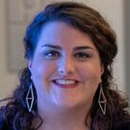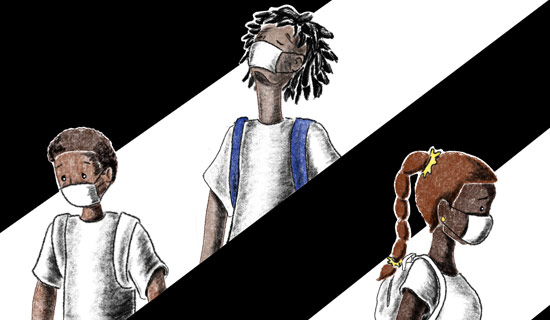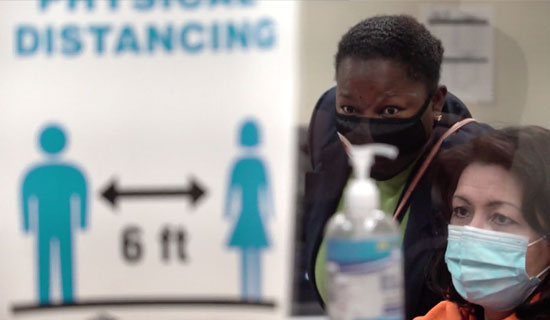During the pandemic, “an absolutely star-studded” Broward College student has been riding his bike to his job and then going to a Dunkin’ Donuts after work to use the restaurant’s internet for his classes.
President Gregory Haile said he recently had a one-on-one conversation with this student and learned that he was “struggling in an extraordinary fashion.”
To help struggling students like him, Broward College recently added food pantries at each of its campuses. The public institution formed a partnership with Lyft to arrange free rides for students who are taking classes in person. And the school distributed 400 laptops that were donated by the utility company Florida Power & Light.
“These are the wraparound services that we know have to exist. Frankly, we have to grow in the investment of this work if our students are going to have a chance,” Haile said Feb. 15 during a special live edition of WLRN’s Sunshine Economy.
The student’s situation demonstrates how inequities like limited access to transportation or technology get in the way of success in school — and how COVID-19 has made it harder for the most vulnerable students.
South Florida’s public colleges and universities serve some of the largest populations of Black and Latino students, as well as low-income students, in the country. The pandemic has hit communities of color disproportionately, and that has shown up in the institutions’ enrollment numbers.
Broward College has lost about 9% of its enrollment, between 5,000 and 6,000 students, since the pandemic began, Haile said.
At Miami Dade College — one of the largest higher education institutions in the country — enrollment is down 7%, or by about 8,000 students, according to that school’s president, Madeline Pumariega.
“Typically, when the economy declines the way that it does, you see enrollment at community colleges increase,” said Pumariega, a former chancellor of the Florida College System who started in Miami Dade College’s top job earlier this year. “But I think it is absolutely related to the pandemic and the economic impact most of our students and their families are seeing.”
Some state universities in Florida have seen a drop in applications for next fall. At Florida International University in Miami, there’s been a 5% decrease in applications compared to a year ago. It is down 3% for Florida Atlantic University in Boca Raton.
Finances are the No. 1 reason students are deciding to delay or forego college, FAU President John Kelly said on The Sunshine Economy. That means federal and state aid as well as private donations could make a difference.
“If we do get the scholarship funds that we’re expecting, we believe that we'll close that gap,” Kelly said.

The First Tuition Increase Since 2013? It’s On The Table
After Republican State Senate President Wilton Simpson was officially appointed to the leadership post in November, a reporter asked him if the COVID-19 budget crunch would force lawmakers to consider increasing state university tuition.
“I think that is a viable opportunity,” Simpson responded, adding that public higher education in Florida is much more affordable than in most other states.
Tuition and fees for in-state students at Florida's public universities add up to about $5,600 a year on average — far less than the national average of more than $9,000. The last time there was an increase in Florida was 2013, and even then, it was less than a 2% hike.
Any effort this year to increase the cost of public higher education, though, will be met with Democratic opposition in Tallahassee. State Senate Democratic Minority Leader Gary Farmer, of Fort Lauderdale, said now is not the time to raise tuition, as so many people are unemployed and suffering economically.
“It’s already hard enough for young people. Our economy is changing before our very eyes,” Farmer said, during an interview for an upcoming Class of COVID-19 television program.
If lawmakers do increase tuition during the 2021 legislative session, which starts early next month, those higher costs might not fall on students’ shoulders, according to leaders of South Florida public institutions.
“It's hard to put too much financial burden on the students. Sometimes putting scholarships in place is an easy way to adjust for that,” said Kelly, the president at FAU. “If there are tuition increases, then it puts more pressure on us as a university: Let's go out and find more donor support. How do we find the people willing to put some financial resources behind these students?”
Haile, from Broward College, said if tuition were increased for community college students, the difference would likely be covered by Pell grants, need-based financial aid provided by the federal government.

Meanwhile, in the Florida House, new Republican Speaker Chris Sprowls has floated his own proposals for how to restructure the financing of public universities.
“Our taxpayer-funded colleges and universities should not be job-training centers, but they also cannot divorce themselves from the economic needs of our state,” Sprowls said during his first speech as speaker last November. “And while our public universities should offer a full range of degree options, it does not follow that the state should subsidize all degrees to the same degree.”
Sprowls’ message echoed that of past Republican leaders in Florida: the idea that not all academic programs have the same return on investment for taxpayers. Sprowls proposed a 50% tuition discount for students who choose majors that are connected to high-demand industries. He also outlined a plan for half-price classes for students who pursue their education online.
Kelly said some degrees’ usefulness in the workforce might not always be obvious.
“If you're looking for human resource help, people who have degrees like psychology might be very beneficial to thinking through the processes of what a person needs to be satisfied at their work,” Kelly offered.
However, both FAU and FIU are reviewing their degree programs with the goal of getting rid of those with too-low enrollment.
Kenneth Furton, provost and chief operating officer of FIU, said the university is also creating degrees to help students adapt to the changing economy.
“We've been adding new degrees like the Internet of Things and crime science and other areas that we know there is a demand, based on industry needs,” Furton said on The Sunshine Economy. “We're encouraging students to either consider moving into these majors or picking up a second major or a minor in the areas that are more competitive.”

Local University, College Leaders Look To Federal Government For Help
So far, South Florida’s colleges and universities have survived the pandemic with an influx of federal funding from the CARES Act and other aid packages. Moving forward, leaders said they are hoping for additional federal funding and policies that could help their institutions and students recover.
If President Joe Biden makes good on his pledge to forgive up to $10,000 of student loan debt per borrower, “it'd be wonderful for our students,” Kelly said.
“Anything that would reduce the overall debt that students have would be a tremendous benefit,” he said.
Haile, from Broward College, said he would welcome the Biden administration’s proposal for tuition-free community college.
“You'd probably be very surprised by how many [prospective students] get turned away before they even start, for fear that they can't afford it,” he said. “So anything that tells a potential student, particularly coming from the lower-income quintiles, ‘you will be able to afford this opportunity to transform your life,’ I am going to be supportive of it.”
Pumariega agreed, and she added that Miami Dade College is now offering no-cost associate’s degrees through its own “American Dream scholarship.” After other financial aid is applied, the college uses fundraising dollars to cover the rest of the cost of 60 credits.
The college is also launching new scholarships for Black students and LGBTQ individuals.
Haile said addressing Black students’ specific challenges during the pandemic has been a “material focus” for Broward College. Haile is Black and is among the 8% of Black college presidents nationwide.
The school enrolls about 17,000 Black students, and that number is higher than the total enrollment of any historically Black college or university in the country.
“One of the greatest things that we've been doing over the last two and a half years — not just over the last year — is going into the heart of the communities that need us most,” Haile said, “to make sure that they are ingratiated with post-secondary opportunities.”
Funding for “Class of COVID-19” was provided in part by the Hammer Family Charitable Foundation and the Education Writers Association.



